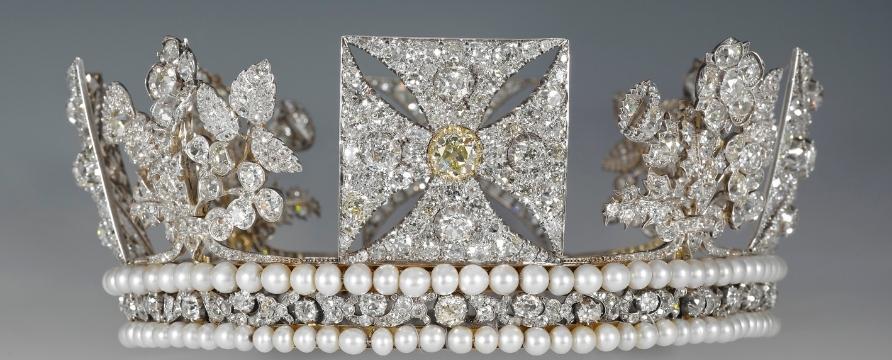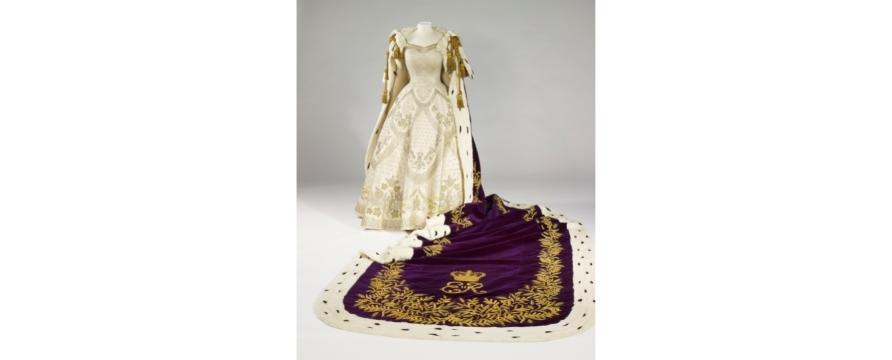
© Royal Collection Trust
Magnificent jewels from the Queen’s personal collection will go on display this summer as part of special displays celebrating the Platinum Jubilee at Buckingham Palace, Windsor Castle and the Palace of Holyroodhouse in Edinburgh. Each display explores a historic occasion in the Queen’s 70-year reign – the Accession, the Coronation and previous Jubilees – through photographs, paintings, works of art, and items of The Queen’s dress and jewellery.
In the State Rooms at Buckingham Palace, which can be visited as part of the annual Summer Opening for the first time since 2019, official portraits of the Queen taken by photographer Dorothy Wilding just weeks after the Accession will be shown alongside items of jewellery worn for the portrait sittings. These include the Diamond Diadem, one of the Queen’s most widely recognised pieces of jewellery. Wilding’s photographs were used as the basis of the Queen’s image on postage stamps from 1953 until 1971, as well as providing the official portrait of Her Majesty which was sent to every British embassy throughout the world, making the Diadem instantly recognisable to millions of people across the globe.
The Diamond Diadem was created for the famously extravagant coronation of George IV in 1821. It is set with 1,333 brilliant-cut diamonds and consists of a band with two rows of pearls either side of a row of diamonds, above which are diamonds set in the form of a rose, a thistle and two shamrocks, the national emblems of England, Scotland and Ireland. The Diadem was inherited in 1837 by Queen Victoria, who was frequently painted and photographed wearing it, including on several early postage stamps such as the Penny Black. The Diadem passed to Queen Alexandra, Queen Mary, Queen Elizabeth the Queen Mother and then to Her Majesty the Queen, who wore it on the day of her Coronation and has worn it on her journey to and from the State Opening of Parliament since the first year of her reign.
The spectacular Delhi Durbar necklace will also be on display at Buckingham Palace. The necklace incorporates nine emeralds originally owned by Queen Mary’s grandmother, the Duchess of Cambridge, as well as an 8.8 carat diamond pendant cut from the Cullinan diamond – the largest diamond ever found. The necklace was made for Queen Mary as part of a suite of jewellery created for the Delhi Durbar in 1911. The Queen inherited the necklace in 1953 and wore it in a portrait sitting for Dorothy Wilding in 1956 – thought to have been their last sitting together before Wilding’s retirement in 1958.

© Royal Collection Trust
At Windsor Castle, the Coronation Dress and Robe of Estate worn by the Queen for her Coronation at Westminster Abbey on 2 June 1953 will be displayed. To recognise the importance of her role as Head of the Commonwealth Nations, Her Majesty asked for the emblems of the seven independent states of which she was monarch to be incorporated into the design of her Coronation Dress, together with those of England, Scotland, Ireland and Wales. The emblems were embroidered in gold and silver thread and pastel-coloured silks, encrusted with seed pearls, sequins and crystals.
The Queen often wears brooches that represent the emblems of Commonwealth countries while visiting or meeting their representatives. Visitors to the Windsor Castle display will see brooches including: the Canadian Maple-leaf Brooch, worn by Her Majesty (then Princess Elizabeth) on her first visit to Canada in 1951; the Flame-Lily Brooch, the emblem of Zimbabwe, which was pinned to The Queen’s mourning clothes when she returned to Britain from Kenya after the death of her father in 1952; the New Zealand Silver Fern Brooch, presented by the Women of Auckland on Christmas Day, 1953; the Australian Wattle Brooch, presented on the Queen’s first visit to Australia in 1954; and the Sri Lanka Brooch, presented to her during a State Visit to Sri Lanka in 1981.
At the Palace of Holyroodhouse, visitors will see a display of outfits worn by the Queen on occasions to celebrate the Silver, Golden and Diamond Jubilees. In 1977 for the Queen’s Silver Jubilee, the royal couturier Sir Hardy Amies designed a striking ensemble of dress, coat and stole in pink silk crêpe and chiffon with a matching hat designed by Frederick Fox with flowerheads hanging from silk stems. The ensemble was worn at the National Service of Thanksgiving at St Paul’s Cathedral on 7 June 1977 marking the 25th anniversary of the Queen’s Accession.
On display for the first time will be the Queen’s Diamond Jubilee ensemble, worn to the National Service of Thanksgiving at St Paul’s Cathedral and a luncheon at Guildhall, City of London, as part of the celebrations on 5 June 2012. The ensemble was designed by Angela Kelly, Personal Adviser to The Queen (Wardrobe) and consists of a pale turquoise dress and coat embroidered with scattered silver flowers, with a coordinating hat.
Alongside the ensembles worn by the Queen will be a selection of gifts presented during official engagements in Scotland, as well as a group of works relating to Her Majesty’s first official visit to Edinburgh in 1953, soon after her Coronation. Examples include a silver model of a miner’s Davy lamp, presented in 1958 when the Queen made her first descent into a working coal mine on the opening of the Rothes Colliery in Fife, and the ceremonial key to the Palace of Holyroodhouse, which is presented to Her Majesty at the start of Royal Week at the Palace each summer.
To find out more, visit Royal Collection Trust website.








